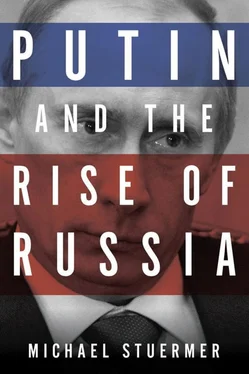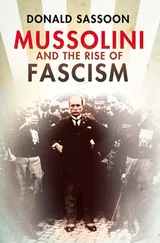Throughout 2007, speculation about who would succeed Putin as president concentrated on two candidates: Dmitri Medvedev and Sergei Ivanov. In early summer 2007 Ivanov was promoted from defence minister to first deputy prime minister with responsibility for setting up Russia’s future industrial policy – nanotechnology capturing much imagination and most of the funds – creating national champions, inviting foreign direct investment and know-how but also for keeping foreigners away from the keys of industrial power.
Medvedev, a jurist by training, once leapt to Putin’s defence when he was under investigation in St Petersburg for some shady real estate transactions. Easy-going, soft-spoken and elegant in appearance – the Boston Globe newspaper named him best-dressed politician, and with style – Medvedev is well versed in the world economy and seems to understand Russia’s role in it. At the Davos World Economic Forum in February 2007 he pronounced every article of the liberal credo. Medvedev also set himself apart from Putin by insisting that he believed in democracy without any specifications – distancing himself from Putin’s Russian-style ‘sovereign democracy’ – and that he ultimately believed in the regulatory power of the markets over the wisdom of the state bureaucracy. This should not be taken as a flirtation with rebellion but as an indication that Medvedev could be more than his master’s voice. His experience in addressing the paramount needs of people across the country must have informed him about the real state of the country beyond the deceptive glitter of Moscow and St Petersburg. In Davos he spoke about the need to diversify the economy, to restore run-down infrastructure, to develop human capital. He knows that this cannot be done by fiat, and that it will take time and a lot of energy, not to mention serious cooperation with the West. He mentioned the danger in Russia’s one-dimensional dependence on energy production and energy prices. On the scourge of corruption he was as brutally outspoken as Putin – and as bewildered as Putin. In all of this, the decline of the Russian population, and what to do about it, will be his greatest worry.
Surely, Medvedev presented himself not as a Eurasian ideologue but as a Western-type businessman. If Davos man had had a say in the Kremlin’s appointments policy here was the man who seemed to share his language and his pro-business philosophy, wearing elegant suits flown in from Berlin and English shirts, soft spoken and intelligent, with pleasant manners, liking heavy metal and presenting the civilized, European face of post-Soviet Russia. Had a vote been taken at Davos, Medvedev would have won hands down.
But what carried the day at Davos needed a Russian translation, and Medvedev gave it, a fortnight before he was to be elected president, at Krasnoyarsk, a well-to-do city in the very heart of Siberia, not far from Novosibirsk. There he outlined what in the West would pass as an election; he shied away from precise commitments but indicated the general direction for Russia, provided always that world energy markets would continue to fuel for Russia’s economic miracle. He talked about the ‘Four Is’: Infrastructure, Innovation, Investment, Institutions. While it took Medveder forty-five minutes to outline his programme, Putin took away the limelight by holding, live on national TV, a four-hour presidential press conference – his last one, for the time being. Medvedev, most likely, was not amused.
What Medvedev outlined was the translation of public wealth into private welfare. Pensions should be doubled. Private property should be protected – ‘we will support free enterprise’ – and the conservation of the environment should be inscribed into the constitution. His programme could best be described as a social market economy. Wohlstand für alle – Ludwig Erhard’s famously effective formula has found, at long last, a Russian echo: well-being for all and sundry, and respect for mother nature.
Medvedev poses as a pragmatist. Vis-à-vis a nation deeply tired of big ideas, he does not waste his time on ideologies. His family background is middle-class, a techno-elite with liberal leanings. He poses as a technocrat, above party and politicking. Does he have a national vision? Even less so than Putin: ‘Each nation should have multiple ideas and objectives which bring people together sharing the same state, the same country.’ He presents himself as open to a pluralism of ideas and social concepts. ‘We do not have to reinvent anything of importance. The basic values have long been pronounced. What matters is to adapt them to Russia’s present and future.’ Will he have the courage and the power to reduce the role of the intelligence services and the police while opening Russia to liberal market forces? In the 1990s privatization gained a bad name, making many poor and few rich. The early years of the twenty-first century have seen a reverse movement, towards state corporations, national champions and sovereign wealth funds. Medvedev will have to face not only the losers of the past two decades but also the winners. His challenge will be to turn the windfall profits from oil and gas into the basis of a future middle-class society and, in order to turn theory into practice, to find allies for all of this, both at home and abroad.
The making of a president
‘Dima’ Medvedev had been, ever since Putin had returned from his Dresden assignment to St Petersburg in 1989, a loyal assistant and adviser, more than ten years his junior. In the mid-1990s he had followed Putin to Moscow and into the Kremlin. When Putin was anointed by the ailing Yeltsin to be the future president, Medvedev organized – and won – the dicey 1999–2000 election campaign.
In recent years, combining the key dossiers of public welfare with supreme control of Gazprom made him central to Putin’s programme. Although Putin’s chosen successor, he is unlikely to be the absolute master of the Kremlin. The Kremlin administration is a spookocracy, and Medvedev, while the nominal master, comes from a different tribe. So far, his role was to be the moon to Putin’s sun. What made him attractive to Putin as a potential successor is also his greatest weakness: he lacks traction with the power ministries (Interior, Emergencies, Defence, Foreign Affairs).
Medvedev’s tenure will be a continuation of Putin’s policies, and Putin, in whatever incarnation, will continue to be for some time the ultimate authority. To the Moscow White House, where the Premier resides, he will take with him his enormous popularity and influence, and it will last for a year or two. Within this period he will have finally to determine what kind of future he envisages for himself. Kremlin or no, Putin is able to redesign the organization of government in his favour without much difficulty and keep the levers of power – most of them.
United Russia will wave anything through the state Duma if and when Putin so decides. Just how thorough a revision of the power structure Putin will want to make depends on whether he is considering a renewed bid for the presidency in 2012 – or at any time before. Questions remain: can Putin be safe and content in a second-rate position? And can the wielders of power in Moscow live comfortably with a split leadership? And what about the Russian people: can they imagine supreme power residing anywhere but in the Kremlin’s hallowed halls?
Putin will probably remain Russia’s voice for high politics, world affairs and the occasional confrontation with the West and he will be able and willing to make foreign policy an instrument to shape the domestic power structure. Medvedev will embody reliability and be a partner for big business. When he was named successor to Putin the Russian share index jumped forward. But he will also need to be the man to grasp the nettle and be serious about Russia’s ailments old and new.
Читать дальше











